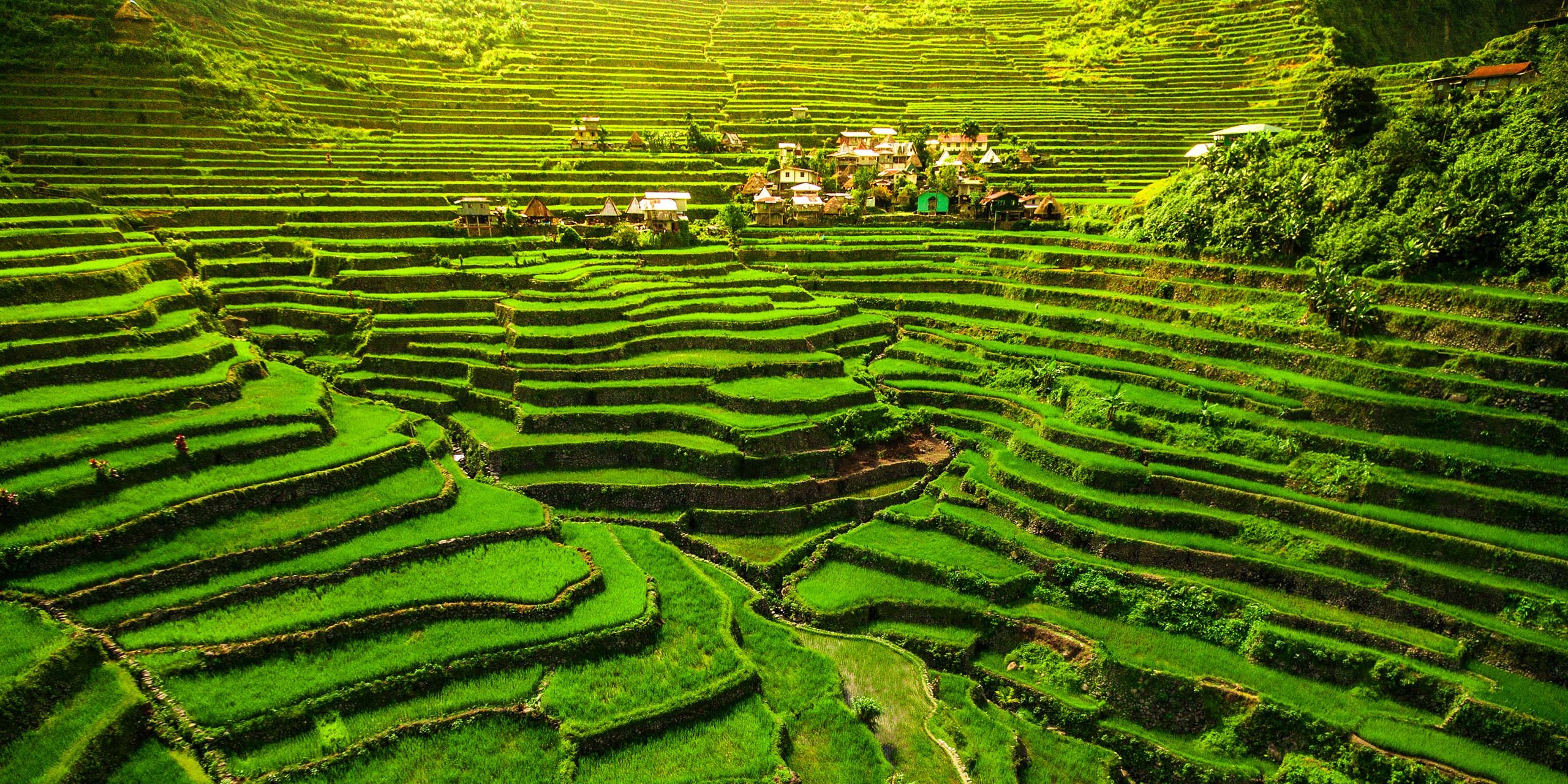
In return for their hospitality, the village elders requested that we sing a song from our country, stood up with hands on hearts. Sharing anxious glances around the campfire, we remembered how our guides had told us this was a village of ex-headhunters.
Still, we obliged with a wobbly rendition of God Save the Queen, voices echoing out to the valleys of rice paddies below. In return, the elders declined to sing their national anthem and instead shared a haunting melody known as the Sagada Hymn: “Sagada, Sagada, You’ll Always Be Mine.”
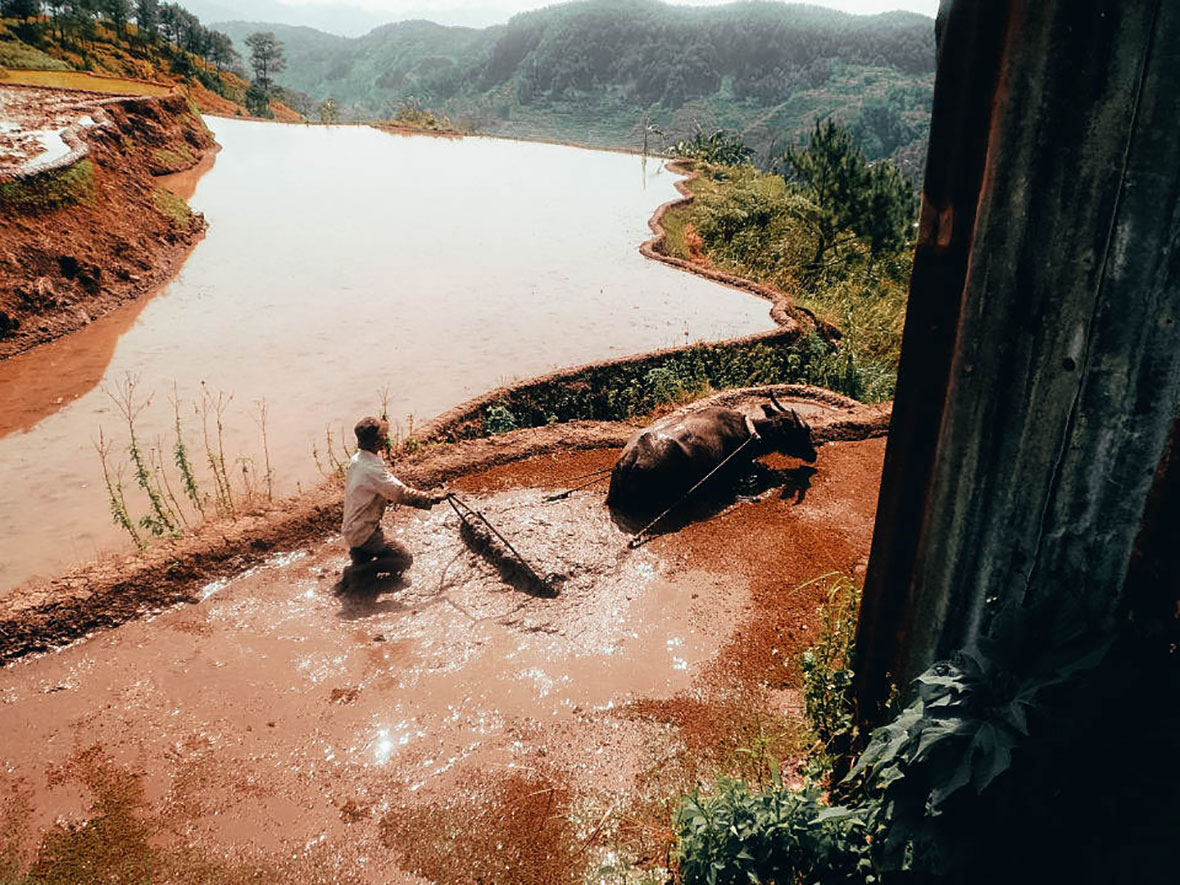
Our stay at the village was an accident. After spending our first day in Sagada exploring the famous hanging coffins and spelunking down Sumaging Cave, our local guides suggested we might enjoy a day hike through rice paddies to nearby waterfalls, a route that ended at hot spring pools. Our party agreed to this idea and we set off early the following morning, carrying only some water, a swimsuit, a towel and a change of clothes.
Much is written of Southeast Asia’s tiered rice terraces, but no words or photos of the ancient staggered steps, expertly cut into hillside, quite do the landscapes justice. The vivid colors of young crops, the quilt-like pattern over valleys and the clouds reflected in earthy pools. We waved at rice farmers knee-deep in mud and buffalo pulling ploughs, while our guides picked off hungry snails they caught snacking on the shoots.
Keeping to the mud-packed edges of the paddy without slipping in and disturbing the growing crops requires about the same skill as a gymnast tip-toeing along a beam. Before long, our shoes were caked in brown, and I admit I was easily the most off-balance and muddied culprit of the group.
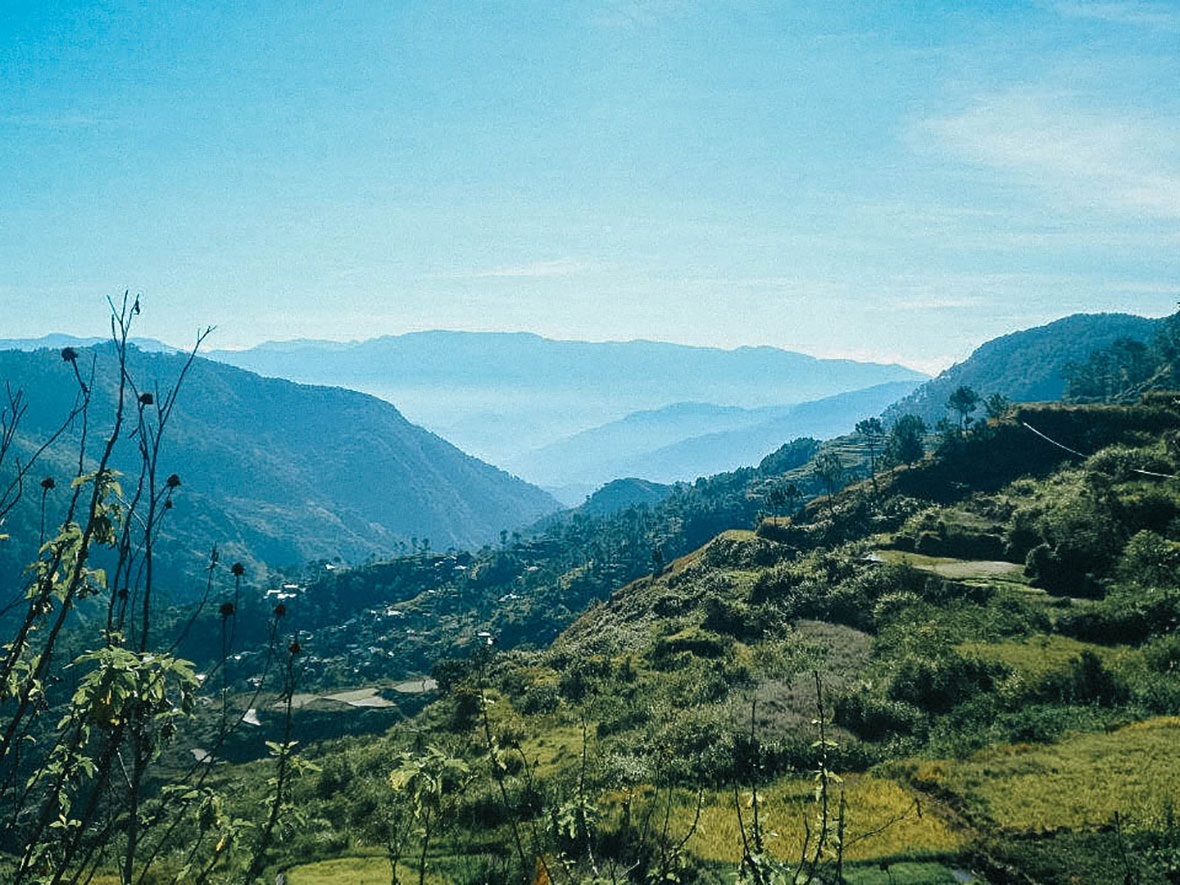
Arriving to the waterfall was a welcome break as the day grew hotter and helped remove the layers of dirt. Some of us cooled our feet in the water, while the bravest jumped from the rocks into the lagoon below. Yet, as we started uphill again, it became obvious one of our party was not well. We stopped for a picnic lunch, redistributed the weight of our backpacks, acquired walking sticks from fallen branches, played games to distract and tried to keep going, but our pace had fallen far behind.
That was when our guides recommended we detour to a nearby village where there was a doctor.
And so, we arrived in the late afternoon, only to learn that the doctor (or at least, midwife) was away. We wouldn’t be able to get back to Sagada the way we came or reach our intended destination by going forward before nightfall, so our group was kindly offered the village’s stilted typhoon shelter for a night’s accommodation.
As the sun started to descend and we resigned ourselves to an adventure out in the open, curious children came to stare at the nine foreigners who would be staying the night. There was much giggling and pointing, with some of the older boys kicking or throwing little pebbles in our direction, chins raised in defiance. We smiled nervously in return.
We were still wondering what to make of each other when a football rolled over to our feet. A quick kick back and suddenly we were all friends. Few languages break down barriers as much as sport.
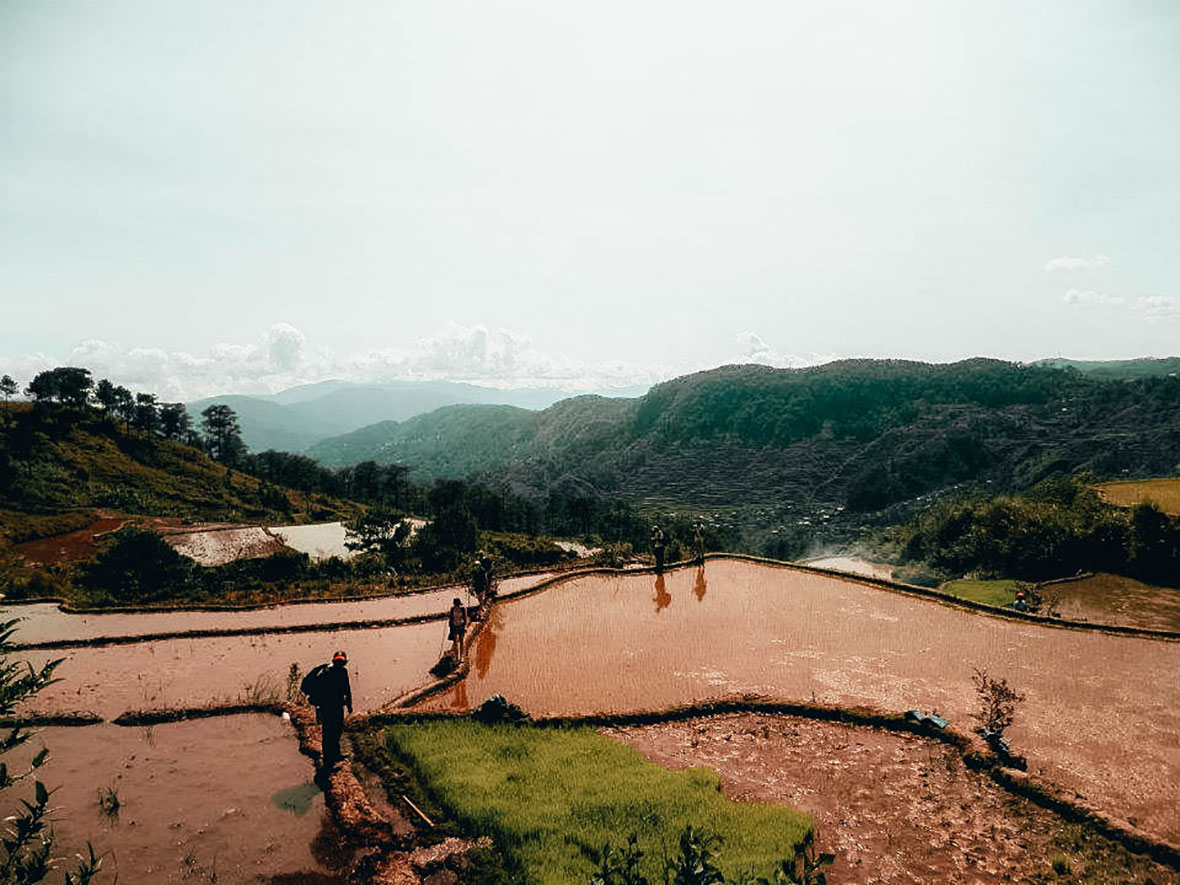
The older boys had a kickabout, while the girls and younger kids were fascinated by our digital cameras. All wanted a portrait and to see their likeness in the screen. Judging by the poses they struck – peace signs and cheeky grins – this wasn’t their first rodeo.
When dusk fell, a campfire was lit, the children returned home to their families and then the village elders came out to sit with us. We were served a dinner of salted pork, rice and leafy vegetables, which we ate with our hands. It was a modest meal by most standards, yet it easily ranks as one of the best I’ve ever had in the Philippines. The tangy pork was bursting with flavor and although I never thought I’d wax lyrical about rice, it was the fluffiest and most fragrant I’d ever tasted and have ever eaten since. Of course, the meal was enjoyed even moreso after the long day hiking as well as the setting; a backdrop of mountains, which had harvested everything on our plates.
It was after dinner that we had exchanged songs – the elders smoking and staring over the flames (to me, it seemed, at least) disapprovingly. As we stumbled over “Long to-oo re-ign ooooo-ver us” to stony faces, I thought of the kids who had thrown pebbles at us a few hours earlier, chins up high.
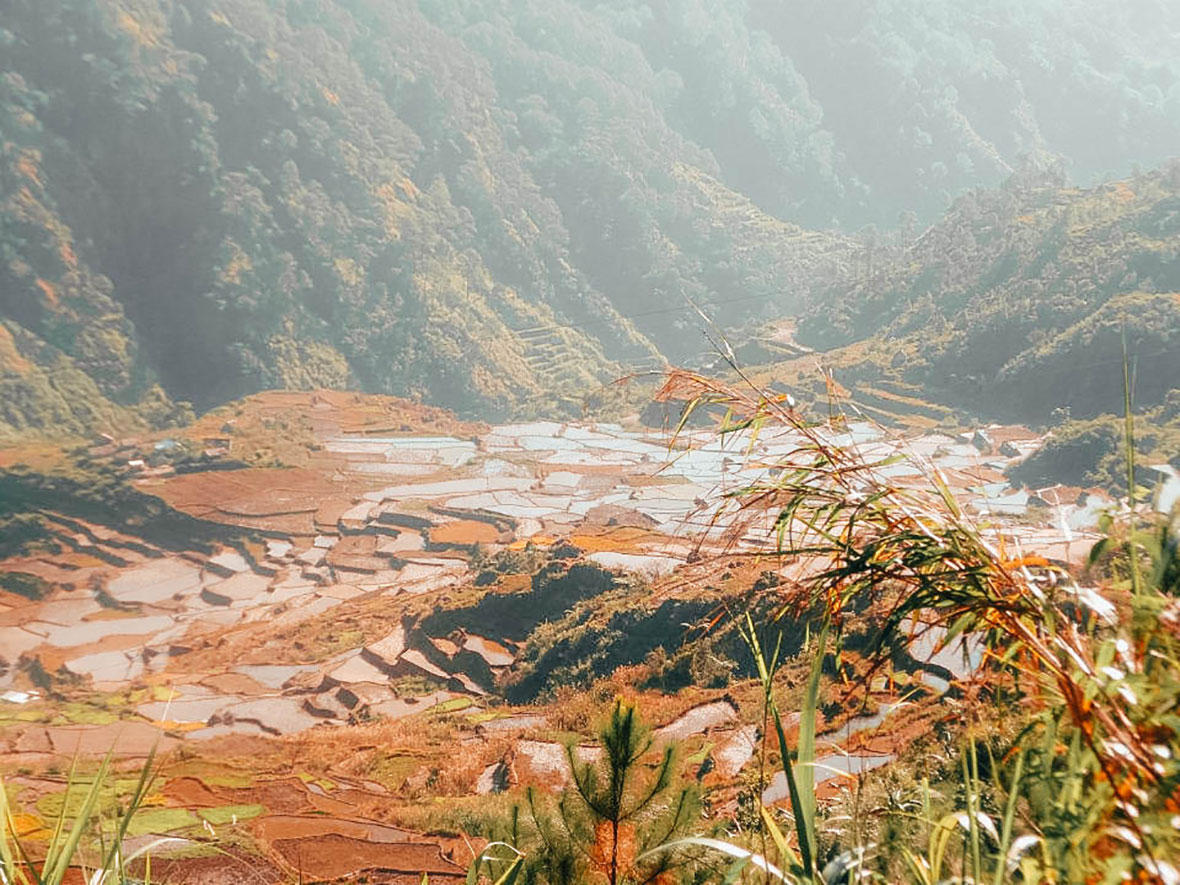
No offence to Queen Liz, but the Sagada Hymn made a much more powerful impression. The melody is sad and nostalgic, with lyrics in both English and Kanakanaey:
Beyond those travelled hills of the North,
Lies my home all laden with pines.
Amidst the soft and silken touch,
Of morning mist I lay my prayers before thy shrine.
Much like sport, music does the trick, as it was after our performances it was decided we could stay in one of the empty houses in the village rather than sleep on the concrete floor of the typhoon shelter. In the warmth of the house, we laughed together around the cozy fireplace, telling jokes and sharing stories before turning in for the night. I fell asleep wrapped in a donated blanket, under a defiled portrait of Imelda Marcos with the eyes scratched out.
In the morning, sickness had thankfully mostly lifted and we set off again, waved off by one of the kids who insisted on one more wrestle before our departure. Arriving at the hot springs by the afternoon, we boiled eggs in the hottest of the spurting pools and pinched our noses at the stench of sulphur, but were glad to wash away our sweat and soak our weary muscles in the volcanic waters after such a journey.
The camaraderie forged by our misadventures kept us in high spirits as we sang songs from the roof of a jeepney on the ride back town. This time we ditched God Save the Queen and opted for classics from the Spice Girls’ repertoire. Winding around the rice terraces, we had only railings to grip onto for the hairpin bends.
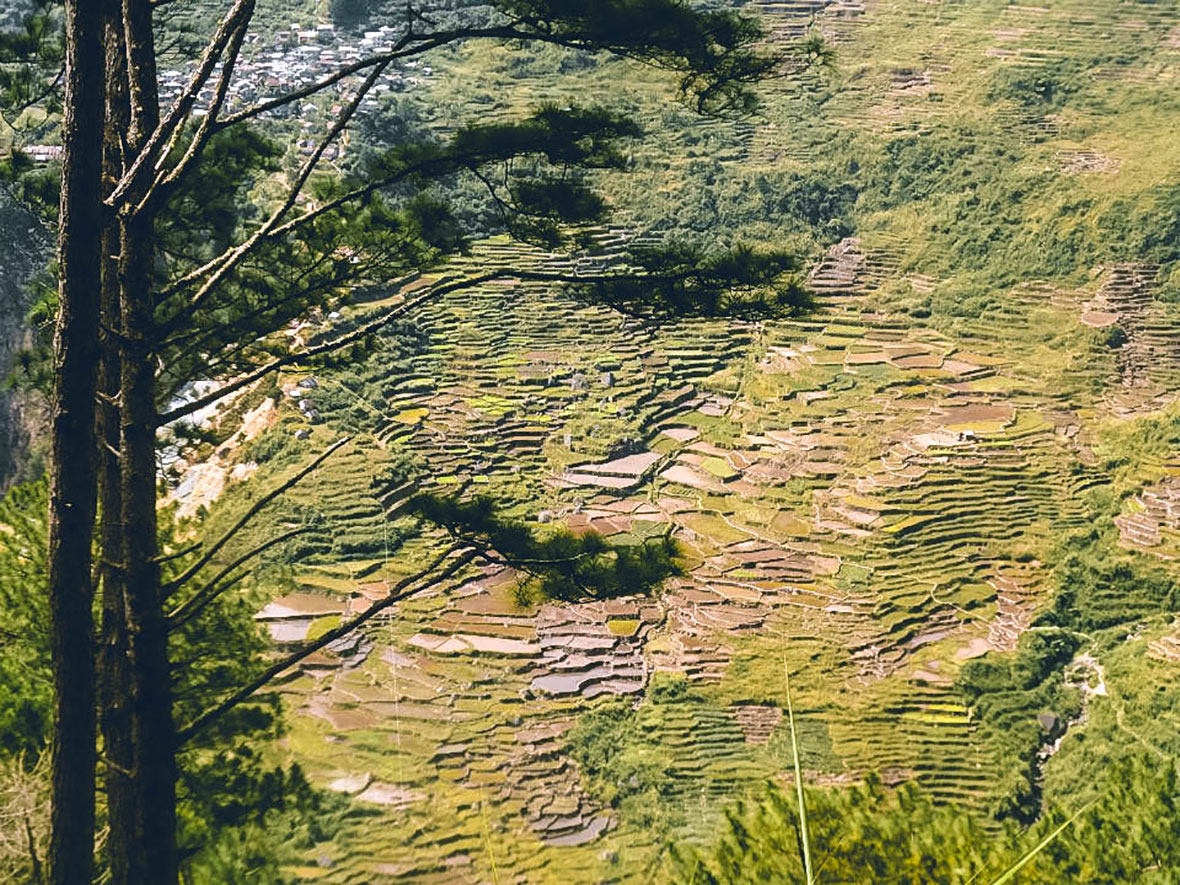
Our guides insisted on buying a chicken to cook for us that evening back in Sagada. This was a live chicken, which we made the mistake of naming Henrietta Marie (never name an animal you later plan on eating). She accompanied us around town on a leash before we made it back to the guesthouse we had rented for a few nights. Needless to say, Henrietta Marie did not enjoy the jeepney ride as much as we did, though I like to think she enjoyed the tour of the local museum.
Aside from Henrietta Marie’s bloody slaughter and consumption, which was of course traumatizing, our final evening in Sagada was spent with our guides, playing cards well into the night and falling asleep, happily exhausted after an eventful few days.
Our village stay in the mountains of Sagada was an accident. Yet, what is true of all the best travel stories, it’s the moments when plans go awry that make for the most poignant travel memories.
When I look back over photos and think of that trip around Northern Luzon, what sticks out most is the dragon’s back of green-covered mountains explored both on foot and by musical jeepney, the gracious hospitality of the villagers and our local guides, and the haunting refrain, “Sagada, Sagada, You’ll Always Be Mine.”
